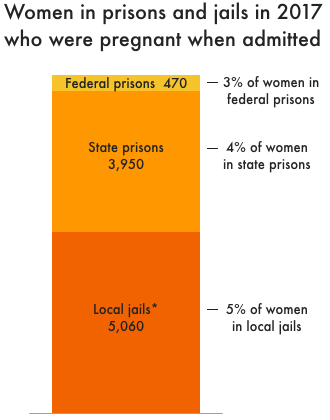Prisons neglect pregnant women in their healthcare policies
Our 50-state survey finds that in spite of national standards, most states lack important policies on prenatal care and nutrition for pregnant women.
by Roxanne Daniel, December 5, 2019
This past August, released surveillance footage showed 26-year-old Diana Sanchez alerting Denver County Jail deputies and medical staff that she was in labor just hours before she gave birth to her son, alone in her cell. With her pleas ignored by staff, Sanchez was forced to give birth without any medical aid or assistance. Her experience is not isolated, as a number of reports by women in prisons and jails across the country have revealed a similar disregard for pregnant women’s basic needs.
What’s more, the documentation of pregnancies and pregnancy care is sparse, sometimes anecdotal, and rarely generalizable on a national level. The most recent data from the Bureau of Justice Statistics (BJS) was collected more than 15 years ago. In 2002, BJS found that 5% of women in local jails were pregnant when admitted. For prisons, BJS reported that in 2004, 4% of women in state prisons and 3% of women in federal prisons were pregnant upon admission. The government has not released any further national data since.
 These estimates are based on the number of women under local, state, and federal jurisdiction in 2017 and the percentages of women in prisons and jails who were pregnant when admitted, as reported by the Bureau of Justice Statistics. *Note that the estimate for women in local jails is based on the jail population on a single day, not the much greater number of women admitted to jail over the course of a year.
These estimates are based on the number of women under local, state, and federal jurisdiction in 2017 and the percentages of women in prisons and jails who were pregnant when admitted, as reported by the Bureau of Justice Statistics. *Note that the estimate for women in local jails is based on the jail population on a single day, not the much greater number of women admitted to jail over the course of a year.A recent study of 22 U.S. state prison systems and all U.S. federal prisons, published in the American Journal of Public Health, found a similar pregnancy rate; roughly 3.8% of the women in their sample were pregnant when they entered prison from 2016-2017. While the rate of pregnancy in prison may have remained stable since the early 2000s, the additional 10,000+ women imprisoned since then indicates that the number of women who are incarcerated while pregnant has grown, too. As long as the mass incarceration of women endures, incarcerated pregnancies will continue to rise.
Given the scale and stakes of this issue, it is imperative that correctional systems set policies that ensure the health and well-being of pregnant women in their custody. Provisions for adequate nutrition and prenatal medical care must be codified in policy to protect against negative health outcomes, such as miscarriages and low fetal birth weights, that can impact mothers and their children for the rest of their lives.
To see the extent to which these concerns are currently being addressed, we evaluated the policies of each state’s prison system and the federal Bureau of Prisons (BOP) to screen for adherence to nationally recognized guidelines. Troublingly, many states fail to meet even basic standards.
Continue reading →



